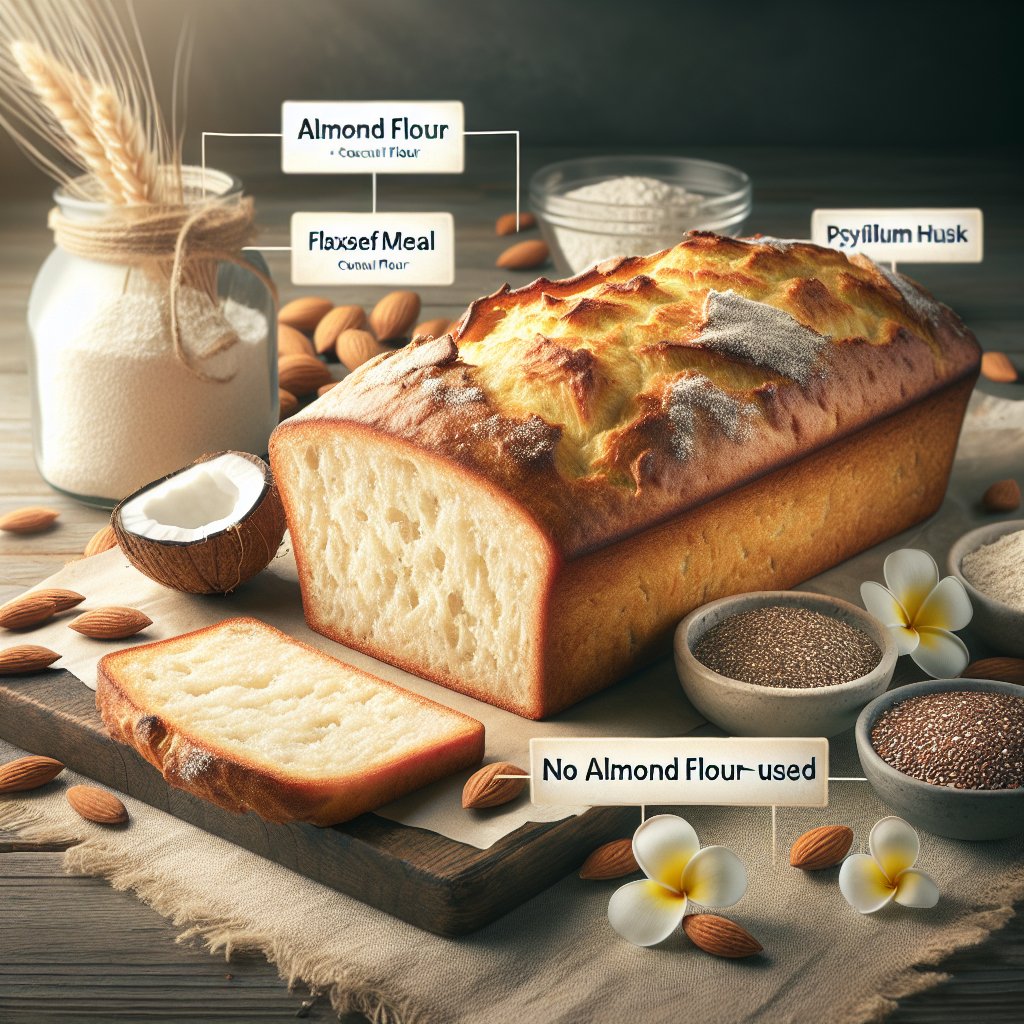Discover the Secret to Delicious Keto Bread: No Almond Flour Required!
Discover the Secret to Delicious Keto Bread: No Almond Flour Required!
Are you a fan of the ketogenic diet? Have you ever wondered why the keto diet has gained such massive popularity in recent years? And why there’s a growing interest in almond flour-free keto bread? Well, you’re in for a treat as we delve into the fascinating world of ketogenic baking and explore the rising trend of almond flour-free keto bread.
The ketogenic diet has been all the rage not only for weight loss but also for its potential health benefits. Keto enthusiasts swear by its ability to help with weight management, blood sugar control, and mental clarity. It’s no wonder that people are always on the lookout for innovative ways to make delicious keto-friendly alternatives to their favorite carb-laden foods, and that’s where almond flour-free keto bread comes into the picture.
So, what’s the deal with almond flour-free keto bread, and why is it gaining momentum in the keto community? Let’s find out!

Benefits of Keto Bread without Almond Flour
When it comes to keto bread, almond flour has been the traditional go-to ingredient. However, there are amazing advantages to exploring the world of almond flour-free keto bread. One of the most important benefits is allergy considerations. Almond flour is a common allergen, and for those with nut allergies, it can be a real struggle to find suitable options. That’s where almond flour-free keto bread comes in, offering a delicious and safe alternative for anyone with nut allergies.
Another great advantage is taste variation. Almond flour-free keto bread opens up a whole new spectrum of flavors and textures. From coconut flour to psyllium husk, the options are diverse and exciting, allowing you to experiment and find the perfect taste that suits your preferences.
Furthermore, almond flour-free keto bread offers nutrient diversity. Different flours bring different nutrients to the table, ensuring that you get a wider range of vitamins and minerals in your diet. For instance, coconut flour is high in fiber, while flaxseed meal is packed with omega-3 fatty acids. By incorporating these alternatives, you can enhance the nutritional profile of your keto bread.
Alternative Ingredients for Keto Bread
While almond flour is a popular ingredient in keto bread recipes, there are alternatives that can be used for those with nut allergies or for those seeking variety in their keto baking. Here are some alternative ingredients for keto bread that can replace almond flour:
Coconut Flour
Coconut flour is a great alternative to almond flour. It’s highly absorbent, so you’ll need less of it in recipes. Start by using 1/4 to 1/3 cup of coconut flour for every cup of almond flour in the original recipe.
Flaxseed Meal
Flaxseed meal is another excellent substitute. It’s high in fiber and healthy fats, making it a nutritious choice for keto bread. Use an equal amount of flaxseed meal as you would almond flour in your recipe.
Psyllium Husk
Psyllium husk is a fiber supplement that can add structure and moisture to keto bread. It’s often used in combination with other flours. For every cup of almond flour, you can add 2-3 tablespoons of psyllium husk.
Chia Seeds
Chia seeds can be ground into a flour-like consistency and used as an alternative to almond flour in keto bread. Substitute chia seed flour equally for almond flour in your recipes.
Experiment with these alternative ingredients to find the best combination for your keto bread, and enjoy the delicious results!

Best Practices for Baking Keto Bread without Almond Flour
So, you want to bake delicious keto bread without using almond flour? No worries, I’ve got you covered with some fantastic tips and techniques to help you succeed in this venture. Let’s dive in!
Ingredient Ratios
When it comes to almond flour-free keto bread, it’s crucial to use the right combination of ingredients to achieve the perfect texture and flavor. Consider using a blend of coconut flour, flaxseed meal, psyllium husk, and eggs. Studies have shown that these ingredients can provide a good structure and moisture to the bread, making it an ideal alternative to almond flour.
Mixing Methods
Proper mixing is key to achieving a uniform and well-risen keto bread. Research suggests that blending the dry ingredients first and then gradually adding the wet ingredients can help prevent clumping and ensure a smooth batter. Incorporating enough air into the mixture can also contribute to a lighter texture.
Baking Times
Research indicates that baking almond flour-free keto bread at a moderate temperature (around 350°F) for approximately 50-60 minutes can yield the best results. However, oven temperatures may vary, so it’s essential to keep an eye on the bread and use a toothpick to check for doneness.
By following these tips and techniques, you can create delectable keto bread without almond flour that’s perfect for your low-carb lifestyle!
Recipe Ideas for Keto Bread without Almond Flour
Are you on the lookout for delicious and creative recipes for keto bread that don’t use almond flour? Look no further! While almond flour is a popular choice for keto bread, there are plenty of equally delicious and nutritious alternatives to explore. Whether you’re looking to switch things up, have an almond allergy, or simply prefer to avoid almond flour, there are fantastic options to try. From coconut flour bread to seed-based bread and even cheese bread, the options for almond flour-free keto bread are truly versatile and mouthwatering. Let’s dive into these delightful variations that will bring a whole new dimension to your keto lifestyle!

Nutritional Benefits of Almond Flour-free Keto Bread
Let’s take a closer look at the incredible nutritional profile of keto bread made without almond flour. The absence of almond flour doesn’t mean compromising on essential nutrients. In fact, almond flour-free keto bread can be a powerhouse of nutrition.
First, let’s talk about fiber. Keto bread without almond flour can be rich in fiber, thanks to the use of coconut flour or flaxseed meal. Fiber is crucial for digestive health and can help with maintaining a feeling of fullness, which can be especially beneficial for those on a keto diet.
When it comes to protein, almond flour-free keto bread sources its protein from eggs, which are not only an excellent source of high-quality protein but also provide essential amino acids necessary for various bodily functions.
Furthermore, this alternative keto bread can be fortified with essential micronutrients such as magnesium, potassium, and B vitamins, all of which are important for overall health and well-being, especially on a low-carb diet like keto.
So, if you’re looking to enjoy the nutritional benefits of keto bread without almond flour, rest assured that it can still offer a well-rounded mix of fiber, protein, and vital micronutrients.
Customer Reviews and Testimonials
Let’s take a moment to celebrate the success stories of individuals who have tried almond flour-free keto bread recipes. The positive feedback and testimonials for these recipes have been incredibly inspiring, emphasizing not only their adherence to the keto lifestyle but also their satisfaction with the taste and texture of the bread.
Many individuals have raved about the delicious taste and fluffy texture of almond flour-free keto bread. One user, Sarah, shared, “I never thought I could enjoy bread on the keto diet until I tried these recipes. The taste is amazing, and the texture is just like traditional bread.”
Another user, Michael, emphasized how satisfying it was to find a keto-friendly bread that didn’t rely on almond flour. “The texture is perfect for sandwiches or toast, and the taste is so satisfying. It’s a game-changer for my keto journey,” he enthused.
These heartening testimonials reflect the overall satisfaction and culinary success people have experienced with almond flour-free keto bread, showcasing the endless possibilities of the keto diet.
Exploring Diverse Options for Keto Bread Without Almond Flour
After diving into the world of keto bread without almond flour, it’s clear that there are so many exciting and diverse options available. From coconut flour to flaxseed meal and psyllium husk, the possibilities are truly endless. Each alternative flour brings its own unique texture and flavor, allowing you to experiment and find the perfect fit for your taste buds and dietary preferences.
One of the most exciting takeaways from this exploration is that you don’t have to limit yourself to one type of flour. Mixing different alternatives can create a delightful blend, bringing together the best of each option. This not only adds variety to your keto bread creations but also contributes to a well-rounded nutritional profile.
As you continue on your keto bread baking journey, don’t hesitate to try out new flours and get creative with your recipes. Embracing the diverse array of options provides an enriching experience and ensures that you’ll never get bored with your keto-friendly baking endeavors!


